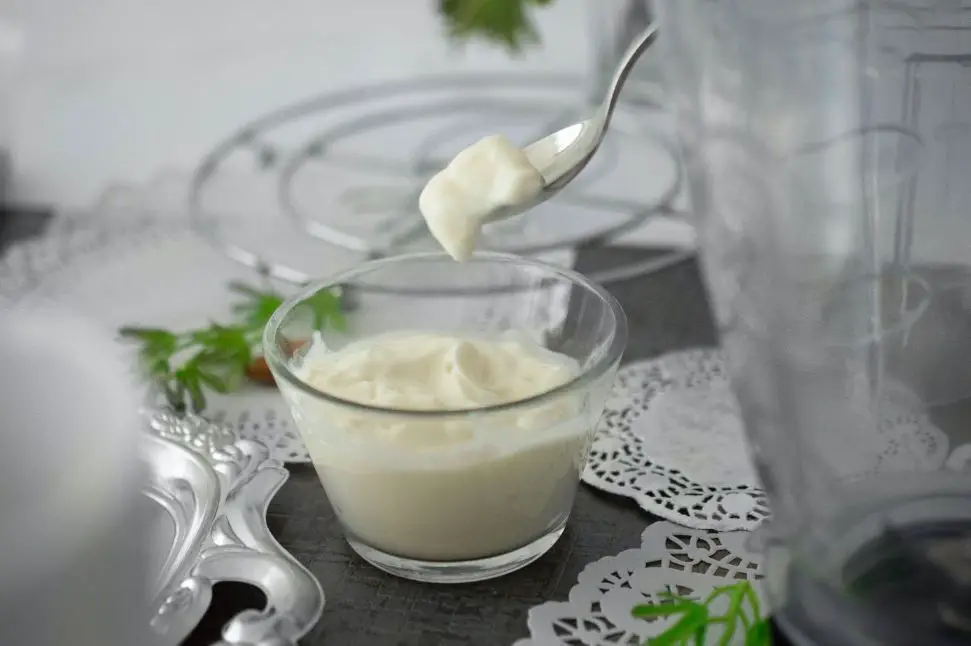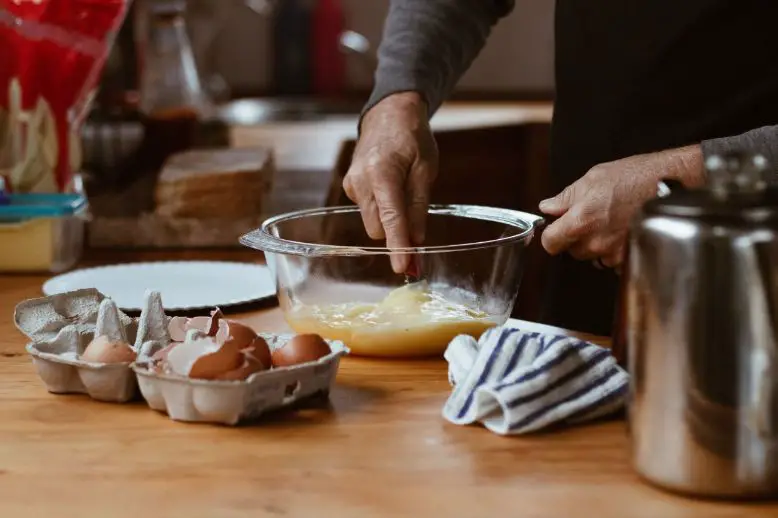Bread is something that many of us love to eat and enjoy. It’s a versatile food that can be made in so many different ways, using different ingredients and techniques.
Eggs are a popular choice that can add richness, flavor, and even more nutrition to your bread.
But, exactly what happens when you add egg to bread dough?
In this article, we’re going to dive into the effects of adding eggs to bread dough.
I’ll talk about how it can change the texture and taste of your bread, and how it can even boost the nutritional value of your loaf.
Plus, I’ll share 4 tips for adding eggs to your bread dough to help you make the most delicious and nutritious bread possible.
So, let’s get started!
What Happens When You Add Egg to Bread Dough – Revealed
Adding eggs to bread dough has been a common practice in baking for many years.
Eggs are known to impact the texture, flavor, and color of the final product. Here are the 4 main effects of adding eggs to bread dough.
1. Improved Texture
Texture plays a crucial role in baking and can be affected by various ingredients, including eggs.
Eggs are commonly used in baking as a binder, which means that they help hold all the ingredients together.
They also provide moisture and richness to bread dough, resulting in a softer texture and crumb.
The protein found in eggs also contributes to the texture of baked goods. When added to bread dough, the protein helps create structure and volume.
This is due to the ability of egg proteins to coagulate, or solidify, during baking.
This solidification process helps trap air bubbles in the dough, resulting in a lighter finished product with a better crumb.
Additionally, the fat content in eggs can affect the texture of baked goods.
In recipes that call for whole eggs, the fat in the yolk can add richness and contribute to a tender crumb.
Egg whites, on the other hand, contain very little fat and can help create a lighter texture in baked goods.
2. Enhance the Appearance
The use of egg yolks in bread dough can give the bread a golden hue.
This is due to the reaction between the proteins in the egg yolks, the heat from the baking process, and the sugar in the bread.
As the bread bakes, the proteins in the egg yolks undergo a chemical reaction that leads to the golden coloration of the bread.
The color of the bread is affected by the amount of egg yolks added to the dough. The more egg yolks are used, the richer and deeper the color of the bread will be.
3. Better Crust
If you want to make the crust of your bread crispy and golden brown, adding eggs to your bread dough can be an excellent solution.
One of the key benefits of adding eggs to bread dough is that it gives the crust a glossy sheen, which can make it more visually appealing.
The proteins in the egg whites also contribute to the crust’s texture, making it crispy and crunchy.
Eggs are known to add flavor and moisture to bread, which can result in a softer, more tender crumb.
This can be especially beneficial for bread recipes that are denser or have a coarser texture.
4. Improved Nutritional Value
The addition of eggs to bread dough can significantly enhance its nutritional value due to its richness in vital nutrients such as protein, vitamins, and minerals.
For instance, eggs contain vitamin D, vitamin B12, and selenium, which are essential nutrients that play a significant role in maintaining healthy body functions.

Protein is one of the vital components of eggs, which can help increase the bread’s protein content when added to the dough.
Protein is essential for muscle growth and repair, and it also aids in weight management.
Additionally, vitamin D is essential for healthy bones, and its presence in eggs can be beneficial for individuals who do not get enough vitamin D from other dietary sources or sunlight exposure.
Vitamin B12 is essential for the formation of red blood cells and the proper functioning of the nervous system. It also plays a vital role in DNA synthesis and cell metabolism.
The inclusion of eggs in bread dough can help increase the bread’s vitamin B12 content.
Selenium is an essential mineral that is required in small amounts in the body for proper thyroid function and antioxidant defense.
Eggs are a good dietary source of selenium, and the incorporation of eggs in bread dough can help increase the bread’s selenium content.
By adding eggs to bread dough, you can improve the bread’s overall nutritional value, making it more nutritious and filling.
This makes bread a healthier option for individuals who want to maintain a balanced and healthy diet.
5 Types of Bread That Benefit From Eggs
While eggs can enhance the texture and flavor of many types of bread, there are some types of bread that specifically benefit from the addition of eggs. Here are a few examples:
- Brioche: A rich, buttery bread that is traditionally made with eggs, brioche has a tender crumb and a slightly sweet flavor. Eggs are essential in creating the soft, light texture and distinct yellow color of brioche.
- Challah: A Jewish braided bread that is enriched with eggs, challah has a slightly sweet flavor and a golden crust. The eggs in the dough give the bread a tender crumb and a rich, buttery flavor.
- Croissants: A flaky, buttery pastry that originated in France, croissants are made with a laminated dough that is layered with butter. Adding eggs to the dough enhances its richness and contributes to its tender, flaky texture.
- Panettone: A sweet, fruity bread that is traditionally eaten during the holidays in Italy, panettone is made with a rich dough that is enriched with eggs, butter, and dried fruit. The eggs in the dough give the bread a light, airy texture and a rich, buttery flavor.
- Zopf: A braided bread that is popular in Switzerland, zopf is made with a rich, buttery dough that is enriched with eggs. The eggs in the dough give the bread a tender crumb and a rich, golden color.
4 Tips for Adding Eggs to Bread Dough
If you’re thinking of adding eggs to your bread dough, here are a few tips to keep in mind:
- Use room temperature eggs: Allow the eggs to come to room temperature before adding them to the dough. Cold eggs can inhibit yeast activity and negatively impact the rise of your bread.
- Adjust the liquid: Eggs contain a significant amount of moisture, so you may need to adjust the liquid in your recipe accordingly. If your dough becomes too wet or sticky, add a little extra flour to compensate.
- Mix thoroughly: Beat the eggs well before adding them to the dough to ensure that they are evenly distributed. You can also whisk the eggs with a little bit of water or milk to help distribute them more easily.
- Add gradually: Add the eggs gradually to the dough while mixing to avoid clumps and to ensure that they are fully incorporated.
2 Substitutes for Egg
If you are allergic to eggs or have dietary restrictions that prevent you from consuming eggs. Here I have mentioned two of my favorite substitute for eggs:
1. Applesauce
Applesauce is an excellent substitute for eggs in baking recipes. It provides moisture and helps to bind ingredients together.
It is vegan-friendly and contains natural sweetness. To replace one egg, mix 1/4 cup of unsweetened applesauce with 1 teaspoon of baking powder.
2. Yogurt
Another option for replacing eggs in bread dough is plain yogurt. It adds moisture, richness, and flavor to the dough while helping it rise properly.

Flavored varieties can also be used, but plain yogurt works best. To replace one egg, use 1/4 cup of plain yogurt mixed with 1/2 teaspoon baking soda.
These egg substitutes have proven to be successful replacements in bread-making recipes, providing the same texture and flavor without using eggs.
Storage Options After Adding Egg
When adding eggs to bread dough, it’s important to consider the storage options to preserve its quality and prevent spoilage. Here are some recommendations:
- Refrigeration: This is the best option if you plan on baking the dough at a later date. The dough should be sealed tightly in an airtight container and stored in the refrigerator for up to five days.
- Room Temperature: Once the egg-enriched bread dough has been baked, it can be stored at room temperature for up to three days in a sealed container.
- Freezing: If freezing the dough is desired, it’s best done before adding any eggs. This will help preserve the quality of the dough and extend its shelf life significantly. To freeze the dough, wrap it tightly with plastic wrap or aluminum foil and place it in an airtight freezer bag or container. Frozen bread dough can last up to three months if stored properly.
- Thawing: To thaw frozen bread dough safely, move it from the freezer to the refrigerator overnight. This will help prevent bacteria growth while thawing slowly.
How Many Eggs to Add to Bread Dough?
When adding eggs to bread dough, consider the quantity used. Too much egg will make the dough heavy, while too little won’t give the desired flavor and tenderness.

For a good general guideline, use one large egg for every cup of flour. Adjust accordingly for different recipes or preferences.
Consider the size of the eggs used in the dough.
Large eggs work best with heavier, denser doughs like challah or rye bread, while smaller eggs are suitable for lighter doughs like dinner rolls or white sandwich loaves.
What Happens When You Add Egg To Bread Dough – Conclusion
In conclusion, adding the egg to bread dough can be a great way to improve the texture and taste of your bread.
It’s important to use the right amount of egg so that you don’t risk overmixing.
If you’re looking for an egg substitute or have pre-fermentation considerations, there are plenty of alternative options available.
Finally, after adding egg, it’s essential to consider storage options in order to keep your bread fresh.
I hope this article has helped you understand the effects of adding an egg to bread dough and how it can benefit your baking experience.
With these tips in mind, I’m sure you’ll be able to make some amazing loaves of bread! So get out there and start experimenting with different ingredients – who knows what delicious treats you’ll come up with?

